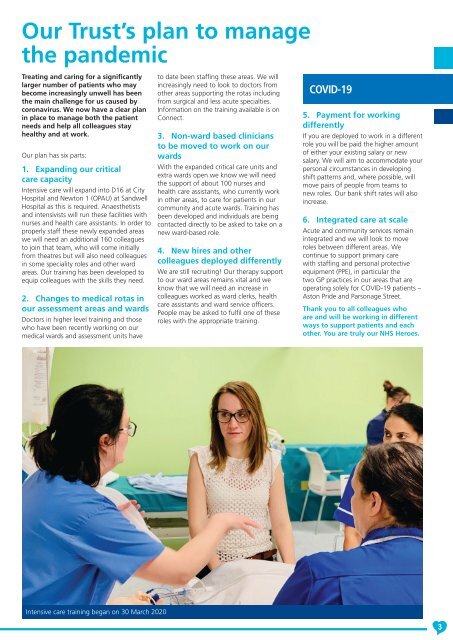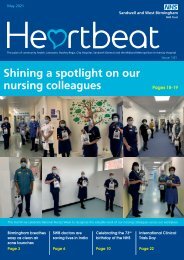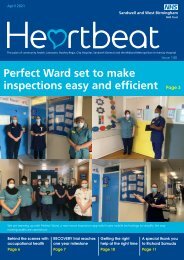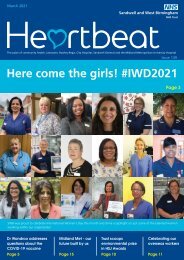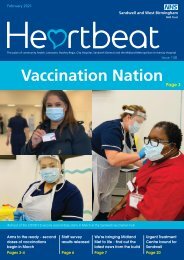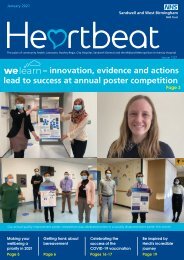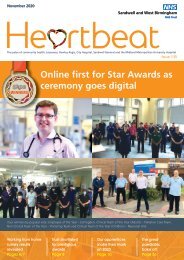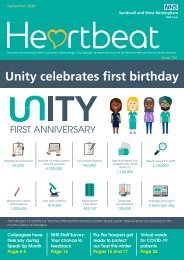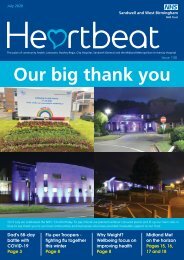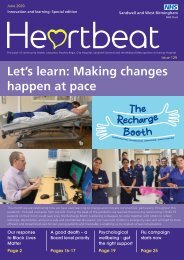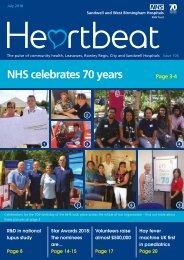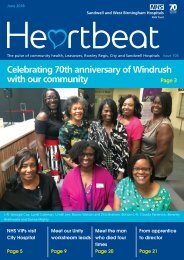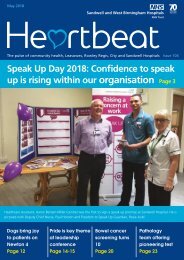Heartbeat March 2020
Create successful ePaper yourself
Turn your PDF publications into a flip-book with our unique Google optimized e-Paper software.
Our Trust’s plan to manage<br />
the pandemic<br />
Treating and caring for a significantly<br />
larger number of patients who may<br />
become increasingly unwell has been<br />
the main challenge for us caused by<br />
coronavirus. We now have a clear plan<br />
in place to manage both the patient<br />
needs and help all colleagues stay<br />
healthy and at work.<br />
Our plan has six parts:<br />
1. Expanding our critical<br />
care capacity<br />
Intensive care will expand into D16 at City<br />
Hospital and Newton 1 (OPAU) at Sandwell<br />
Hospital as this is required. Anaesthetists<br />
and intensivists will run these facilities with<br />
nurses and health care assistants. In order to<br />
properly staff these newly expanded areas<br />
we will need an additional 160 colleagues<br />
to join that team, who will come initially<br />
from theatres but will also need colleagues<br />
in some speciality roles and other ward<br />
areas. Our training has been developed to<br />
equip colleagues with the skills they need.<br />
2. Changes to medical rotas in<br />
our assessment areas and wards<br />
Doctors in higher level training and those<br />
who have been recently working on our<br />
medical wards and assessment units have<br />
to date been staffing these areas. We will<br />
increasingly need to look to doctors from<br />
other areas supporting the rotas including<br />
from surgical and less acute specialties.<br />
Information on the training available is on<br />
Connect.<br />
3. Non-ward based clinicians<br />
to be moved to work on our<br />
wards<br />
With the expanded critical care units and<br />
extra wards open we know we will need<br />
the support of about 100 nurses and<br />
health care assistants, who currently work<br />
in other areas, to care for patients in our<br />
community and acute wards. Training has<br />
been developed and individuals are being<br />
contacted directly to be asked to take on a<br />
new ward-based role.<br />
4. New hires and other<br />
colleagues deployed differently<br />
We are still recruiting! Our therapy support<br />
to our ward areas remains vital and we<br />
know that we will need an increase in<br />
colleagues worked as ward clerks, health<br />
care assistants and ward service officers.<br />
People may be asked to fulfil one of these<br />
roles with the appropriate training.<br />
COVID-19<br />
5. Payment for working<br />
differently<br />
If you are deployed to work in a different<br />
role you will be paid the higher amount<br />
of either your existing salary or new<br />
salary. We will aim to accommodate your<br />
personal circumstances in developing<br />
shift patterns and, where possible, will<br />
move pairs of people from teams to<br />
new roles. Our bank shift rates will also<br />
increase.<br />
6. Integrated care at scale<br />
Acute and community services remain<br />
integrated and we will look to move<br />
roles between different areas. We<br />
continue to support primary care<br />
with staffing and personal protective<br />
equipment (PPE), in particular the<br />
two GP practices in our areas that are<br />
operating solely for COVID-19 patients –<br />
Aston Pride and Parsonage Street.<br />
Thank you to all colleagues who<br />
are and will be working in different<br />
ways to support patients and each<br />
other. You are truly our NHS Heroes.<br />
Intensive care training began on 30 <strong>March</strong> <strong>2020</strong><br />
3


